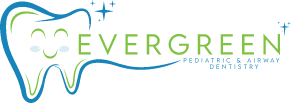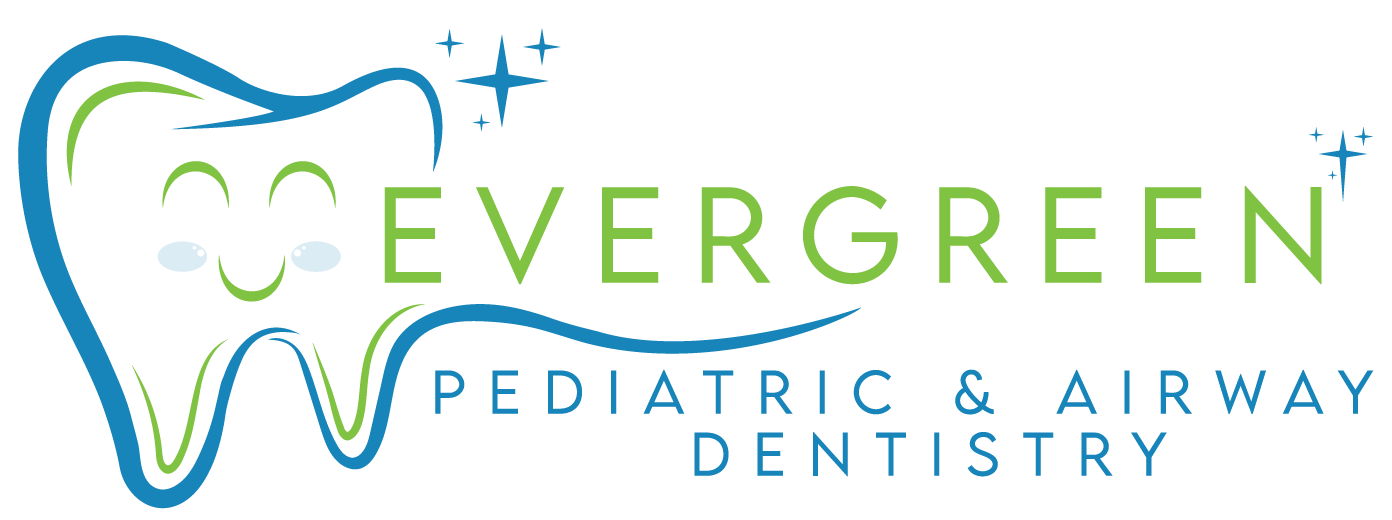Understanding Child Dentist Teeth Cleaning: What to Expect
As parents, we strive to give our children the best start in life, and this includes ensuring their oral health is well-maintained from a young age. Early dental care is crucial for the development of healthy teeth and gums, preventing future dental issues, and fostering good oral hygiene habits. When children become accustomed to visiting the child dentist teeth cleaning, they are less likely to develop dental anxiety and more likely to take their dental health seriously as they grow older.
The Role of a Child Dentist in Preventive Dental Care for Children
A child dentist, also known as a pediatric dentist, is a specialist who focuses on the dental health of infants, children, and adolescents. These dedicated professionals undergo extensive training to address the unique dental needs of young patients, understanding that children’s dentistry requires a distinct approach from adult care. Pediatric dentists are adept at creating a friendly and welcoming environment that alleviates children’s fears of dental visits.
Their expertise encompasses a wide range of services aimed at preventing dental issues and maintaining healthy smiles from infancy through the teenage years. Regular check-ups and professional cleanings form the cornerstone of preventive care, supplemented by fluoride treatments and the application of dental sealants to guard against cavities. Beyond these services, pediatric dentists are equipped to offer comprehensive guidance on effective brushing and flossing techniques, tailored dietary advice to support dental health, and strategies for managing common oral habits such as thumb sucking and pacifier use.
By fostering a positive relationship with dental care early in life, pediatric dentists play a crucial role in ensuring the long-term oral health of the next generation, setting them on a path towards a lifetime of healthy smiles.
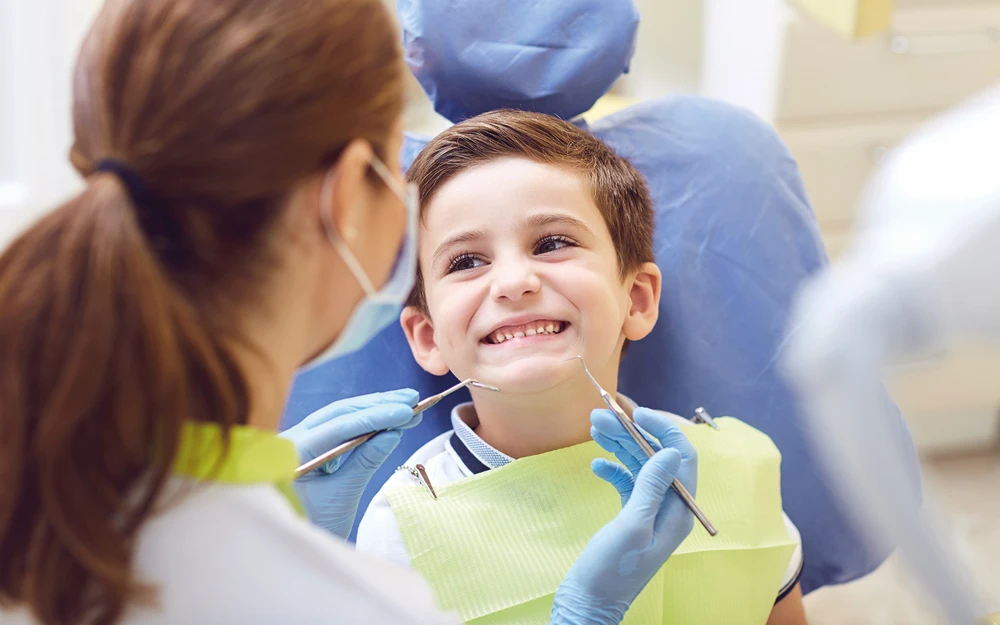
Dentist Teeth Cleaning
What to Expect During a Child Dentist Teeth Cleaning Appointment
A child’s visit to the dentist for teeth cleaning is designed to be as comfortable and stress-free as possible, both for the child and the parents. The appointment typically follows a structured process aimed at gently introducing the child to dental care practices. Initially, the pediatric dentist or a dental hygienist will start with a friendly introduction to help the child relax and feel safe in the new environment. They often use child-friendly language to explain the steps of the cleaning process, sometimes employing storytelling or show-and-tell techniques with dental tools to demystify the experience.
The teeth cleaning itself involves several steps. The dental professional will first examine the child’s mouth to check the overall oral health and look for any signs of potential issues. After the examination, they proceed with the actual cleaning, which includes removing plaque and tartar buildup from the teeth surfaces, flossing between the teeth, and polishing to remove any remaining stains. This is often followed by a fluoride treatment, which helps strengthen the teeth and protect against cavities.
Throughout the appointment, pediatric dentists and their teams make efforts to maintain a positive and encouraging atmosphere, often rewarding the child with a small toy or a sticker at the end of the visit to ensure they leave with a smile. This positive reinforcement helps build the child’s confidence in dental visits and reinforces the importance of good oral hygiene in a fun and memorable way.
Tips for Preparing Your Child for Their First Teeth Cleaning Visit
Preparing your child for their first teeth cleaning visit involves a mix of communication, education, and positive reinforcement. Here are practical tips to ensure a smooth and stress-free experience for both you and your little one:
- Start Early: Talk to your child about the importance of dental health and the role of the dentist in keeping their teeth clean and healthy. Familiarize them with the concept of a dental visit through stories or educational videos aimed at children.
- Role Play at Home: Mimic a dental visit at home to make them comfortable with the process. You can take turns being the dentist and the patient, using a toothbrush to simulate cleaning. This playful approach can reduce fear and anxiety.
- Select Child-Friendly Dental Practices: Choose a dental office that specializes in pediatrics. Pediatric dental offices are often designed with children in mind, featuring colorful rooms, games, and activities that can make the dental visit more inviting.
- Visit the Dentist Before the Appointment: If possible, visit the dental office for a non-treatment visit to allow your child to meet the dentist and staff and become familiar with the environment. This can help ease any apprehension.
- Use Positive Language: Focus on positive language when talking about the dentist. Avoid using words that might induce fear, such as ‘pain’ or ‘shot’. Instead, emphasize that the dentist is a friend who helps keep their teeth strong and healthy.
- Read Together: There are several children’s books about going to the dentist. Reading these stories can help your child understand what to expect and feel more comfortable with the idea.
- Plan a Fun Activity Post-Visit: Arrange for a fun activity after the dental appointment, so your child has something to look forward to. This doesn’t have to be a big event—a simple trip to the park or a favorite snack can work wonders.
By implementing these tips, you can help your child approach their dental visits with confidence and ease, laying the foundation for a lifetime of healthy dental habits.
Common Tools and Techniques Used by Child Dentists for Teeth Cleaning
Child dentists employ a variety of tools and techniques specifically designed to make teeth cleaning a gentle and engaging experience for young patients. Here’s an overview of the most commonly used instruments and methods:
- Soft-bristled Toothbrushes: These are used for removing plaque and food debris from the teeth and gums gently. The small size and soft bristles are perfect for young mouths, ensuring a comfortable cleaning process.
- Flavored Dental Floss: To make the cleaning process more appealing, pediatric dentists often use flavored dental floss. This encourages children to engage with the process and helps them to associate dental care with positive sensations.
- Polishing Tools: These tools have soft rubber cups that are used along with flavored prophylaxis paste to polish teeth. The variety of fun flavors, like bubblegum or strawberry, helps to create a more child-friendly experience.
- Fluoride Treatments: Fluoride varnish or foam is applied to the teeth to strengthen enamel and protect against cavities. Child-friendly flavors make the treatment more acceptable to young palates.
- Digital X-Rays: When needed, child dentists utilize digital X-rays, which emit less radiation than traditional X-rays. They help dentists to check for hidden caries, examine the growth of incoming teeth, and assess the health of the jaw and bone structure.
- Demonstration Models and Visual Aids: Pediatric dentists use colorful and engaging models of teeth and gums, along with interactive digital visuals, to educate children about oral hygiene practices in an understandable and fun way.
- Dental Sealants: A preventive measure where a protective plastic coating is applied to the chewing surfaces of the back teeth (molars and premolars) to prevent tooth decay.
By using these child-centered tools and techniques, pediatric dentists not only ensure a thorough cleaning but also contribute to a positive dental experience, encouraging children to maintain good oral health habits.
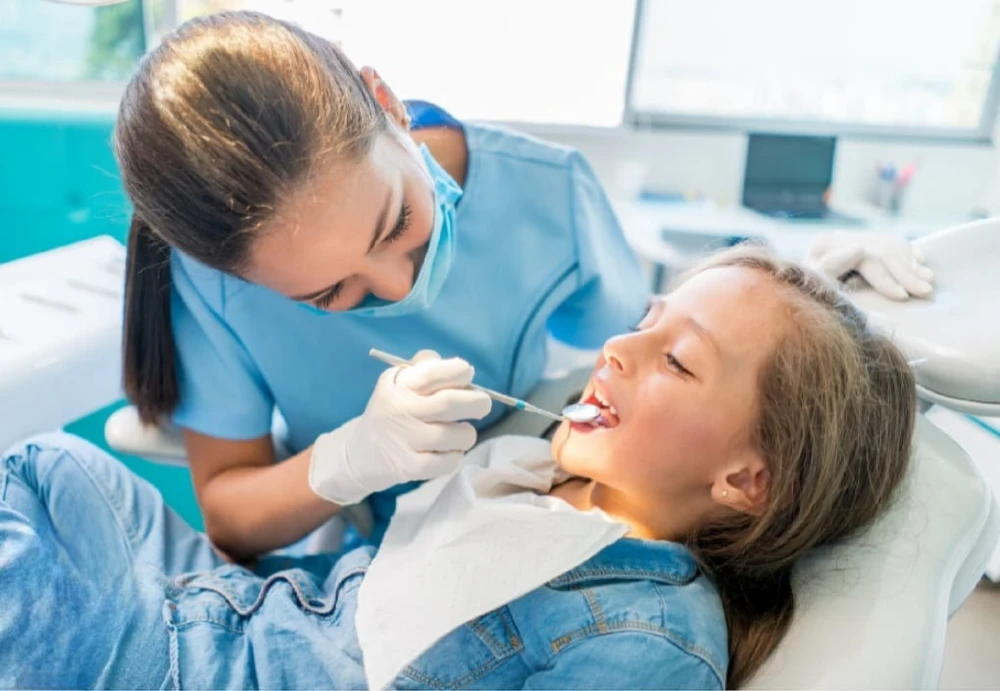
Pediatric Dental Cleaning
Potential Benefits of Regular Teeth Cleaning for Children
Regular teeth cleaning for children comes with a myriad of benefits that extend far beyond just a brighter smile. Here’s an overview of some key advantages:
- Prevents Cavities: One of the most direct benefits of regular teeth cleaning is the prevention of cavities. By removing plaque and tartar build-up, dental professionals can significantly reduce the risk of tooth decay, which is particularly prevalent among children due to frequent snacking and sometimes inconsistent oral hygiene practices.
- Promotes Healthy Gum Tissue: Regular cleaning helps to prevent the onset of gum disease by removing the plaque that causes gum inflammation (gingivitis). Healthy gum tissue is critical for overall oral health and helps in maintaining strong teeth.
- Early Detection of Problems: Frequent visits to the dentist allow for early detection of dental issues, such as cavities, misaligned teeth, or bite problems. Early intervention can simplify treatments and improve outcomes.
- Encourages Good Oral Hygiene Habits: Regular dental visits teach children the importance of maintaining good oral hygiene, setting a foundation for healthy dental practices that last a lifetime.
- Improves Overall Health: There is a well-established link between oral health and general health. By ensuring good oral hygiene through regular dental cleanings, children are at a lower risk for developing associated conditions like heart disease and diabetes later in life.
- Boosts Self-Esteem: A clean, bright smile can significantly impact a child’s confidence and self-esteem. Knowing their teeth are clean and healthy can make children feel more positive about their appearance and social interactions.
- Help in Academic Performance: Poor oral health can lead to discomfort and absences from school. By maintaining regular dental cleanings, children are more likely to attend school consistently and perform well academically.
By instilling the importance of regular teeth cleaning from an early age, parents can help their children enjoy these benefits while promoting a lifetime of good oral health.
Addressing Concerns About Fluoride During a Child’s Dental Cleaning
Fluoride treatments are a common and effective way to prevent tooth decay, especially in children. However, some parents may have concerns about the use of fluoride during dental cleanings. It’s important to understand that fluoride, when used properly, is both safe and beneficial for dental health. Here are a few key points that address common concerns:
- Safety: Fluoride is a natural mineral found in water and many foods. The fluoride used in dental treatments is carefully regulated for safety and efficacy. Pediatric dentists are trained to use the appropriate amount for each child, minimizing any risks and ensuring a safe application.
- Benefits: Fluoride strengthens the tooth enamel, making it more resistant to acid attacks from bacteria and sugars in the mouth. This can significantly reduce the likelihood of cavities and tooth decay, which are common problems in childhood.
- Guidance and Monitoring: Dentists provide guidance on how to maintain a balance, ensuring children get the benefits of fluoride without overexposure. This includes advice on the use of fluoride toothpaste, consumption of fluoridated water, and dietary suggestions.
- Alternatives and Choices: For parents who remain concerned, dentists can discuss alternative preventive measures, such as dental sealants, that can also help protect teeth from decay. However, it’s worth noting that these alternatives may not offer the same level of protection against cavities as fluoride treatments.
- Education: Educating parents and children about the role of fluoride and dental health is essential. Understanding how fluoride works to protect teeth can help alleviate concerns and foster a more positive view of its use in dental care.
Open communication with your pediatric dentist is key to addressing any concerns about fluoride or any aspect of your child’s dental cleaning. They are best positioned to provide the information and reassurance needed to make informed decisions about your child’s dental health care.
The Importance of Post-Cleaning Care and Follow-Up Appointments
While regular dental cleanings are crucial in maintaining a child’s oral health, post-cleaning care and follow-up appointments are equally important to ensure long-term oral hygiene. Immediately after a dental cleaning, children can benefit from a set of guidelines provided by their dentist, which typically includes avoiding certain foods and drinks that could stain the freshly cleaned teeth, such as sodas, fruit juices, and coloured candies. Additionally, maintaining a routine of brushing twice a day and flossing once a day helps in keeping the teeth free from plaque build-up between dental visits.
Follow-up appointments are necessary for a comprehensive approach to dental care. These visits allow the dentist to monitor the child’s oral health closely, track the progression of any previously identified issues, and address any new concerns that may arise. Regular follow-ups can help in promptly diagnosing problems such as cavities, gum disease, or misalignment, which, if left untreated, can lead to more serious dental problems down the line. These appointments also offer an excellent opportunity for reinforcing good oral hygiene habits and educating children and their parents about the best practices for dental care. Overall, post-cleaning care and follow-up appointments are essential in maintaining a healthy smile for life.
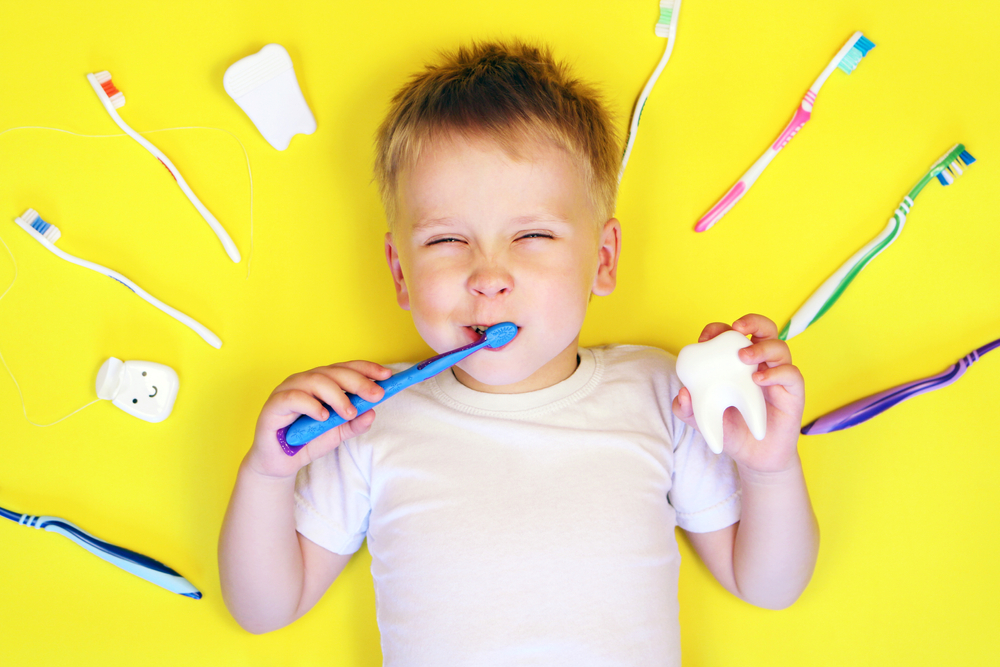
Pediatric Dental Cleaning
Conclusion
Regular dental cleanings are an essential part of maintaining optimal oral health in children. They offer numerous benefits, such as preventing tooth decay and gum disease, promoting good hygiene habits, and improving overall health and self-esteem. Addressing concerns about fluoride during cleanings is also vital to understanding its safety and effectiveness. Post-cleaning care and follow-up appointments are equally crucial in ensuring long-term oral hygiene and detecting any potential issues early on. By setting a strong foundation for healthy dental practices from an early age, parents can help their children maintain a beautiful and healthy smile throughout their lifetime. Therefore, it is essential to prioritize regular dental cleanings and follow-up appointments for the overall well-being of children.
Evergreen Pediatric Dentistry
https://www.google.com/maps?cid=14720788683151219551
12910 Totem Lake Blvd NE #103, Kirkland, WA 98034, United States
(425) 814-3196
https://evergreenkidsdentist.com/
